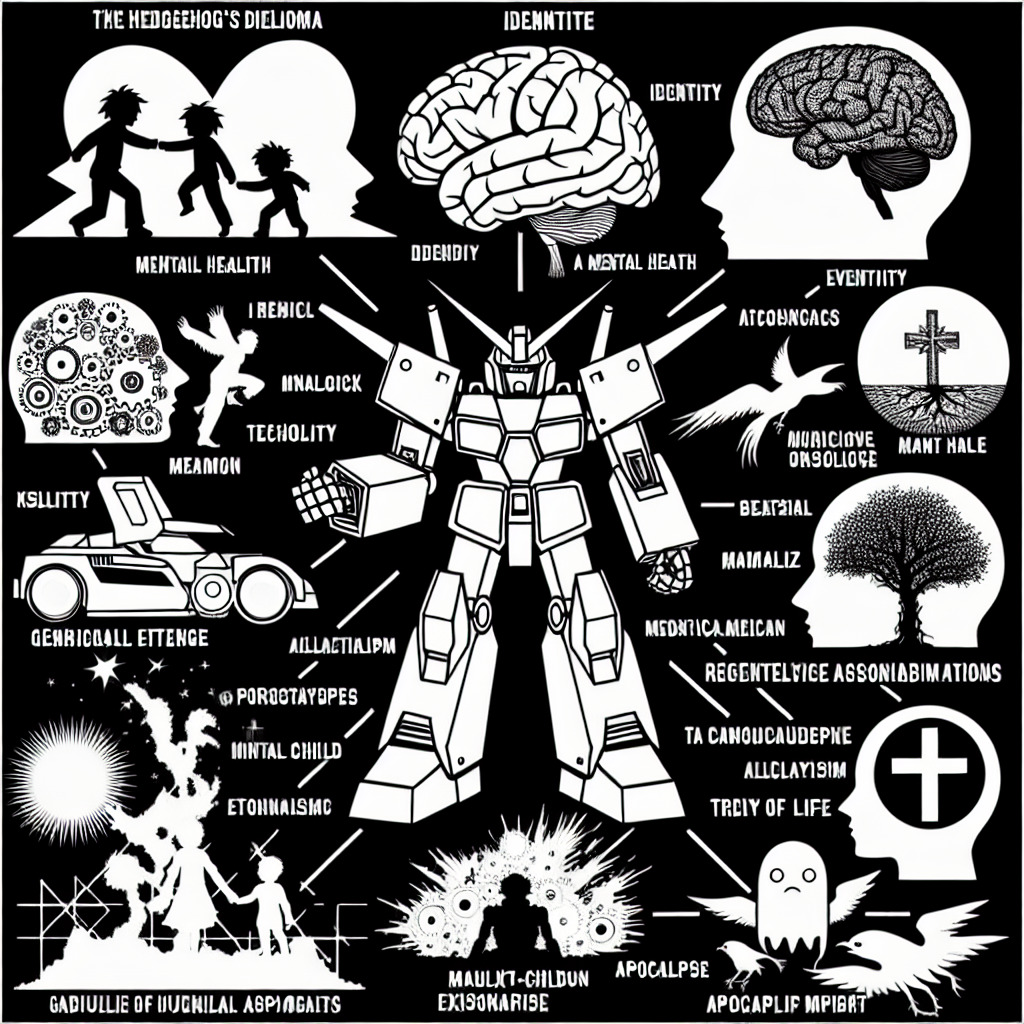Themes in Neon Genesis Evangelion
Neon Genesis Evangelion is renowned for its complex and multifaceted themes. The series delves deep into psychological, philosophical, and existential concepts, making it a rich text for analysis and interpretation. Here, we explore some of the major themes that run through the series, with specific examples from the show.
1. The Hedgehog's Dilemma
This psychological concept is central to the series, especially in Shinji's character arc. It refers to the inability of humans to become close to others without hurting one another, much like how hedgehogs can't get too close without pricking each other with their spines.
Example: Shinji's reluctance to form close relationships, particularly evident in his interactions with Misato and his fellow pilots, Rei and Asuka. His fear of rejection often leads him to push others away, even when he craves connection.
2. Identity and Self-Worth
Many characters in Evangelion struggle with their sense of self and their perceived value. The series poses questions about what defines a person's identity and how one can find self-worth in a challenging world.
Examples:
- Shinji's constant questioning of his worth, often tied to his role as an Eva pilot
- Asuka's need for validation through her Eva piloting and academic achievements
- Rei's journey to understand her own humanity and purpose beyond being a tool for NERV
3. Depression and Mental Health
Evangelion doesn't shy away from depicting mental health issues. The series explores how past experiences, especially childhood ones, can deeply affect a person's mental state and behavior.
Examples:
- Shinji's depression and anxiety, often manifesting as his famous "I mustn't run away" mantra
- Asuka's breakdown after her mind is invaded by an Angel, revealing her deep-seated insecurities and traumas
- Misato's post-traumatic stress from surviving Second Impact
4. Parent-Child Relationships
Dysfunctional family dynamics play a crucial role in Evangelion. The absence of mothers and the impact of parental expectations on children are recurring motifs that drive character development and plot progression.
Examples:
- Shinji's strained relationship with his father, Gendo, and his longing for parental approval
- Asuka's trauma from her mother's mental breakdown and subsequent suicide
- Gendo's obsession with reuniting with Yui, prioritizing this over his relationship with Shinji
5. Existentialism and the Nature of Reality
Especially prominent in the latter part of the series, Evangelion grapples with existential questions about the nature of reality, free will, and the meaning of existence.
Examples:
- The surreal sequences in Episodes 25 and 26, exploring the characters' psyches and alternate realities
- The Human Instrumentality Project as an exploration of collective consciousness versus individuality
- Rei's existential crisis as she grapples with her nature as a clone and her connection to Lilith
6. Religion and Symbolism
The series is rife with religious symbolism, particularly from Judeo-Christian tradition. While the creators have stated that much of this symbolism was chosen for aesthetic reasons, it adds a layer of depth and mystery to the narrative, inviting various interpretations.
Examples:
- The use of the Christian cross in explosions and NERV's logo
- The Lance of Longinus, referencing the spear that pierced Jesus' side
- The Angels as messengers of God, though in this case as antagonists
- The Tree of Life from Kabbalah, used in SEELE's logo and in the series' lore
7. Technology and Humanity
Through the Evangelion units and the concept of the A.T. Field, the series explores the relationship between humanity and technology. It raises questions about the boundaries between human and machine, and the potential consequences of technological advancement.
Examples:
- The Evangelion units as cyborgs, blurring the line between biological and mechanical
- The Magi supercomputer system, based on the personality aspects of Ritsuko's mother
- The concept of the A.T. Field as both a supernatural force and a representation of human individuality
8. Apocalypse and Rebirth
The ever-present threat of Third Impact looms over the series, tying into themes of apocalypse and renewal. This connects to broader questions about the cyclical nature of destruction and creation, both on a personal and cosmic scale.
Examples:
- The catastrophic Second Impact that reshaped the world before the series begins
- The potential for Third Impact as both a cataclysmic event and a means of human evolution
- Shinji's personal journey of breakdown and renewal throughout the series

A visual representation of the major themes in Neon Genesis Evangelion
These themes interweave throughout Neon Genesis Evangelion, creating a complex narrative tapestry. The series' ability to tackle such deep and universal concepts while telling a compelling story about giant robots fighting monsters is a testament to its enduring popularity and critical acclaim. By providing specific examples for each theme, we can see how deeply these concepts are embedded in the narrative and character development of the series.
